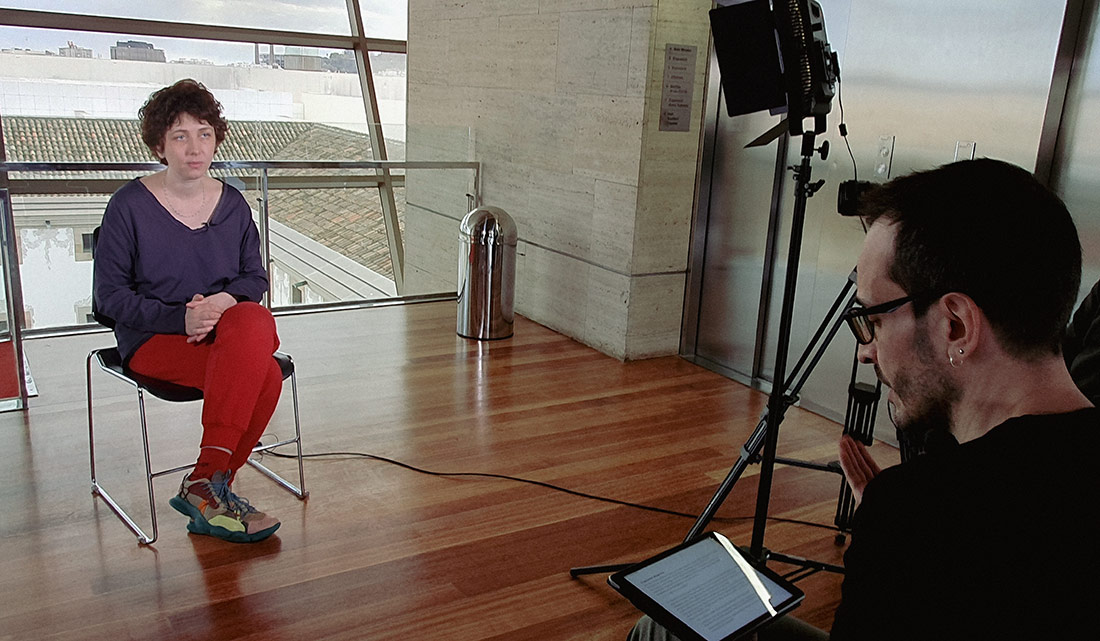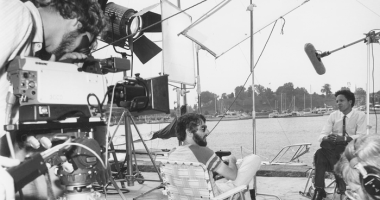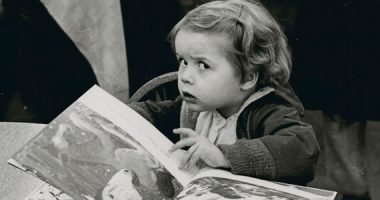Anna Starobinets is a journalist by training and a writer by profession. Born in Moscow in 1978, the author’s bright literary career has been interrupted by the Russian invasion of Ukraine. Like many other writers and intellectuals in Russia today, Starobinets has had to take the painful path of exile (in her case, in Georgia) for having publicly expressed her disagreement with the repression of civil society and with the imperialist expansion promoted by the Russian government, and for refusing to accept the role of puppet that Putin now reserves for writers sympathetic to the regime.
Anna Starobinets’ work consists mainly of narrative, particularly short stories. She has penned works that use elements of horror and fantasy to paint dystopian scenes presented in highly realistic fashion. In this way, she manages to drag her readers into deeply uncomfortable worlds, worlds that may seem strange but which we also recognise as plausible and even familiar. Starobinets’ only work of non-fiction also stirs up similar sensations.
Compared more or less rightly with classic authors of horror, science fiction, fantasy and dystopia such as Bradbury, Dick, Jackson, Orwell, Zamiatin or King, more recently (and perhaps also more rightly) she has been compared on the aesthetic level with Samanta Schweblin, an author of her own generation with whom she shares a remarkable ability to impose the logic of fables and the grotesque on everyday life, to the point where it seems like the only possible logic. The author has so far published three compilations of short stories, four novels and a non-fiction book, as well as a series of detective books for children that has been a resounding success in Russia.
In 2005, Starobinets published the compilation of short stories An Awkward Age (published in English in 2010 by Hesperus Press, with a translation by Hugh Aplin). This early work already contains all the elements that the author would go on to develop later in her literary corpus. It is a diverse compendium that features some of the formal innovations that Starobinets has drawn on in other works and that help her to exploit the anomalies, the predicaments and the discomforts of daily lives that are more than a little disturbing.

In the 2011 novel The Living (published in English in 2012 by Hesperus Press, with a translation by James Rann), Starobinets constructs a dystopian society with a numerus clausus policy, a world with a limited number of inhabitants (or of personalities, in fact) that make up a living whole. A body that functions as a totalitarian system in which we can recognise elements not only of Stalinist repression, but also of today’s society, determined to leave a record of its every action.
In 2013 the author released what is perhaps her most highly acclaimed compilation of short stories: The Icarus Gland (published in English in 2014 by Skyscraper, with a translation by James Rann, and in Catalan in 2023 by Mai Més, with a translation by the author of this article). With the suggestive (and Ovidian, and Kafkaesque) subtitle of A Book of Metamorphoses, the compilation takes transformations as a metaphor for personal and social problems, as a living and magmatic portrait of the tensions we experience in our order, in our supposedly stable construction. The characters in The Icarus Gland totter across the fragile line that divides how we want the world to be and how it will probably end up being, an line that is constantly altered and manipulated by the author’s imagination.
In addition to the three books already mentioned and her successful children’s novels, the book that finally pushed Starobinets to the forefront of contemporary Russian literature was her only work of nonfiction. With the book Look at Him (published in English in 2020 by Three String Books, with an English translation by Katherine E. Young), the author was a finalist for the Russian National Bestseller literary prize in 2017. A harsh and disturbing work, it is a story of perinatal loss that exudes sincerity and truth, that scratches and hurts. A book that denounces the very difficult conditions that must still be endured by women in Russia (and many other places) who find themselves in the situation of having to abort.
Look at Him raised a firestorm in Russia. The author suffered all kinds of attacks for having tackled a subject that is still taboo, that of women’s agency over their own bodies. She sums up the criticism she received with a popular saying: dirty linen should be washed at home. And the fact is that a part of Russian society (because the book was the subject of controversy in the general media) reproached her for speaking out about certain aberrant perinatal practices, arguing that this kind of thing should not be talked about, that pain and suffering should be accepted in silence and with resignation, especially by women. The worst thing, it seems, was not the terrible facts condemned in the book, but the fact that they were written about at all. “For a long time, I doubted whether it was worth writing this book. It’s really too personal. Too real-life. Not literature.” This is what Starobinets says in the foreword to Look at Him. And, to the contrary, the fact is that it is precisely a work of literature. And the good kind. The kind that moves us and stirs us deep inside.
Despite the autobiographical nature of the book, the author also stamps it with her usual literary mark. We find elements that exploit despair, horror, the grotesque and the absurd, as well as humour and self-disparagement. Elements placed at the service of a disturbing story that we recognise as both true and overwhelming. In this case, however, what it is based on is the author’s first-person experience, not her overflowing imagination. And yet, even when explaining the drama of the abortion and, even more, that of the death of her young husband Alexander Garros shortly after the birth of their second child, Starobinets is able to maintain the narrative tension, to sweep us along with the rhythm, to garnish the story with episodes of humour (biting, caustic, sharp), to construct a literary artifact of the first order.
In the end, the author’s entire body of work also deals with one of the recurring themes of Russian literature. Both in her autobiographical work and in her short stories, Starobinets looks squarely in the face of one of the great tragedies of the Russian socio-cultural construct: dehumanisation. From Dostoyevsky’s Notes from a Dead House to Varlam Shalamov’s Kolyma Tales, by way of Eugenia Ginzburg’s Journey into the Whirlwind and the micro-chronicles via Telegram offered during these dismal times by Ilya Yashin from a prison cell, Russian literature has born chilling testimony to the continued disregard for human life promoted by the systems of power of very different currents that have dominated the country over long swathes of time.
Russian society in the early 2000s had begun a seemingly inexorable process of re-humanisation. It was a process within the underlying structure that started off forcefully and that involved the revision of the social values of the Russian political construct: values that the country had been unable to shake off since the turbid Russian Middle Ages, that exploded with the most traditionalist tsars of the 19th century and that resurged during the great Stalinist terror. Unfortunately, however, this change has been not only interrupted, but completely turned around by the war. The process, perhaps a result of the times rather than a conscious and manifest desire of the Russian people, and which also marked a clear generational shift (as well as an epochal and paradigmatic one) has been stopped and reversed with great speed.
And this inversion of the social dynamics has led Russia’s most capable creators, thinkers and communicators, and its most interesting artists and journalists, to a situation of exile and prohibition. And it has left them in environments where they are mostly unable to carry out their creative work as they would like to, and as would be fitting and fair. Starobinets lives (and works) in Tbilisi, the capital of Georgia, in the Caucasus. As is the case for all emigrants, emigration has brought her uncertainty, economic instability and personal and family anguish that is difficult to transform into anything positive, beyond new literary works that can help her to sublimate this scenario of despair. However, the fact that the Russian literary market is closed to her greatly hinders her chances of continuing to grow as a writer.
The scenes of uncertainty and worry and the pictures of dystopian societies that we find in the works of Anna Starobinets have become real scenes of the author’s life. All we can do right now is to read her, listen to her and fervently hope that this enraged giant we know as Russia, which in the fields of science fiction, fantasy and noir has given birth to such powerful names as Bogdanov, Zamiatin, Bulgakov, Petrushevskaya or the Strugatsky brothers, will finally stop trying to strangle and crush its creators, even (and above all!) the most intellectually restless and imaginative ones. Only then will we be able to hear those voices that, as Starobinets says in the interview, have only ever wanted one thing – to sing like canaries in a coal mine and warn of imminent dangers. The one thing, however, that they really do not need, is to share the fateful destiny of these poor creatures who sacrifice themselves by force.




Leave a comment